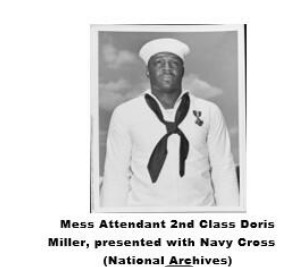Pearl Harbor Remembrance Day –
Doris “Dorie” Miller: An American Hero.
“A DATE WHICH WILL LIVE IN INFAMY”
…December 7th, is the anniversary of the attack on Pearl Harbor in 1941. This was the “last straw” in bringing the United States into World War II. There are countless examples of bravery and sacrifice; one of those who made the ultimate sacrifice was a Black sailor named Doris “Dorie” Miller.
A FUTURE SAILOR BORN INTO POVERTY AND RACISM
Dorie was born in Waco, Texas in 1919. This was a time when there were widespread lynchings of Blacks including Dorie’s hometown where a Black teenager had been burned alive in front of city hall.
He was the son of a Texas sharecropper and grandson of slaves. Having been born into poverty, Dorie dropped out of school to find work to help his family survive.
DECEMBER 7, 1941 ON BOARD THE USS WEST VIRGINIA
In 1939 (before America entered World War II) Dorie Miller enlisted in the U.S. Navy.
In those days, Black sailors were relegated to “messman” status. In essence, they weren’t much more than (as one of Dorie’s shipmates said it) “seagoing bellhops, chambermaids, and dishwashers.” Even though they might find themselves in the midst of battle someday, they were not trained to use weapons.
And then came December 7, 1941. Dorie Miller was onboard the USS West Virginia when the [] attack by the Japanese took place at Pearl Harbor. He was doing laundry when a torpedo struck his ship and, soon, the ship’s Captain was mortally wounded. Dorie lifted his Captain up and dragged him to a relatively safe place.
Although he hadn’t been trained in the use of weapons, he knew he needed to act and act fast. He’s quoted as saying “when the Japanese bombers attacked my ship at Pearl Harbor I forgot all about the fact that I and other Negroes can be only messmen in the Navy and are not taught how to man an antiaircraft gun.”
He grabbed an available antiaircraft gun, quickly figured out how to use it, and, it’s estimated, he was responsible for shooting down half a dozen enemy planes. Having run out of ammunition, Dorie Miller began pulling other sailors from the burning water and, ultimately, helped numerous injured shipmates to safety on shore.
THE ULTIMATE SACRIFICE
…But then…
In November of 1943, Dorie had been assigned to the USS Liscome Bay when a torpedo fired by a Japanese submarine hit his ship.
Only about 1/3 of the crew survived; Seaman Doris “Dorie” Miller… was not among them.
He was ultimately presumed dead and his body was never recovered.
THE LEGACY OF DORIS “DORIE” MILLER
Dorie Miller was awarded numerous military medals and ribbons for his service and valor.
In addition, in 1973, the Navy ship USS Miller was named after him.
His service and sacrifice propelled respect and opportunities for Blacks in the U.S. Navy as well. For example, by 2019, eight Black enlistees had achieved the rank of Admiral.
It’s also recognized that he played a seriously important role in scaling back the Navy’s policy of racial segregation and prejudice as well as for the furtherance of civil rights, in general, in America.
In 1956, a major American newspaper is quoted as saying that Dorie Miller “died for his country so that his people might rise another notch in dignity and courage. Every blow struck for civil rights is a monument to [Dorie] Miller, citizen.”
Other ways that Dorie Miller has been appreciated:
• By numerous community and military-related commemorations, memorials and dedications
• In Michael Bay’s 2001 film Pearl Harbor, Dorie Miller was portrayed by actor Cuba Gooding Jr.
• A USPS commemorative stamp
From Dr. E: This article from Navy Magazine. Dorie Miller was known to our family communities in Texas as his name was legend. I thought then as a child, and think now moving into my 76th year on earth, that Dorie did not save people by race, nor religion, nor ethnicity, nor political affiliation. Just soul to soul. Desperate soul to desperate soul. Brave soul to brave soul. A true equality, a true dignity of souls, both on earth and from heaven.

















